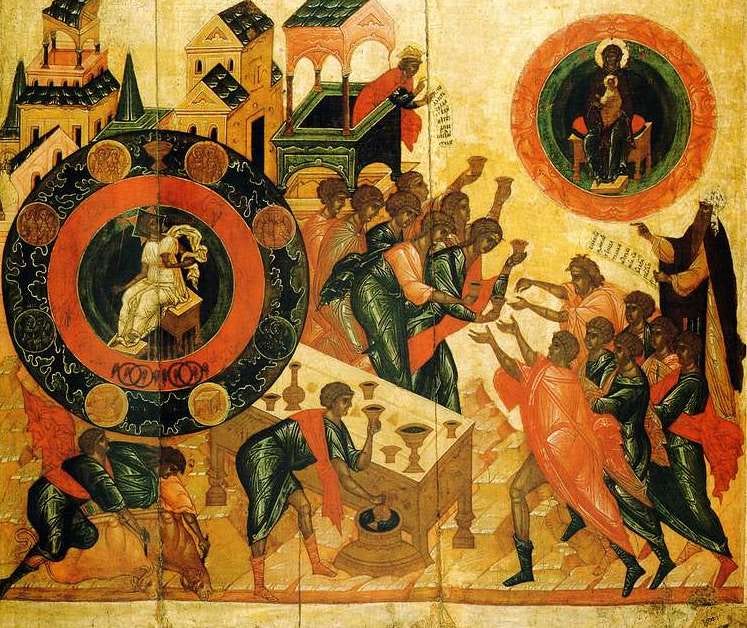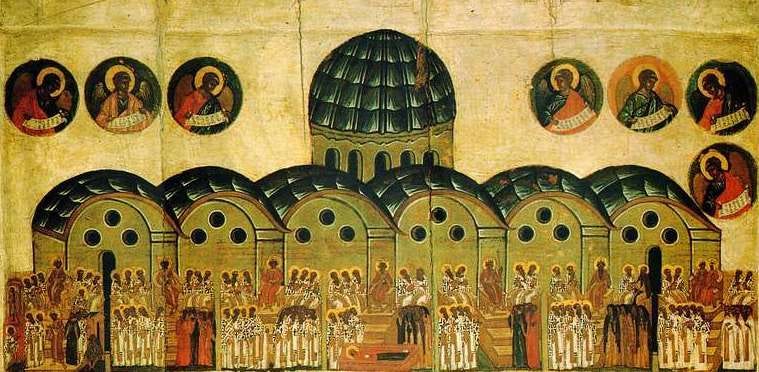Not unusually, the Revised Common Lectionary expands the earlier Roman Catholic Gospel for this week to include Matt 11:16-19 as well as vv. 25-30—one of the things the RCL does generally is have us read more, which is good. The added passage is however excerpted from others concerning Jesus and John (11:2-15), and then also skips over the woes pronounced against Chorazin, Bethsaida and Capernaum (11:20-24) which feeds our perennial temptation to make Jesus meek and mild. Nevertheless what we have works together, although we have to look hard to get past the impression of “Jesus sound bites.” The connection is all about Wisdom (note the capital W).
The Gospel opens with Jesus lamenting the perversity of his generation, using a(n otherwise unknown) children’s game or song; the upshot seems to be that the people can’t be pleased, sneering first at John’s asceticism and then at Jesus’ conviviality in equal measure. Jesus’ resolution is that “Wisdom is justified by her deeds.” Opinions themselves are not the point. In the Luke parallel (7:35) Wisdom is justified by her “children”; whatever their common source said, Matthew’s version more clearly links the vindication of Wisdom to Jesus’ actions (rather than perhaps to John and Jesus personally, in Luke). What are Wisdom’s actions, though?
The theme of Wisdom is the link to the second set of verses. At 11:25 we find an extraordinary statement from Jesus, again shared with Luke, which out of context sounds much more like John’s Gospel:
At that time Jesus said, “I thank you, Father, Lord of heaven and earth, because you have hidden these things from the wise and the intelligent and have revealed them to infants; yes, Father, for such was your gracious will. All things have been handed over to me by my Father; and no one knows the Son except the Father, and no one knows the Father except the Son and anyone to whom the Son chooses to reveal him.
The themes of knowledge and wisdom run through these verses again. The rejection of book-learning as a basis for claiming true knowledge of God is clear. The “infants” are those to whom the Son has given true knowledge of the Father (perhaps these faithful little ones are being contrasted with the unruly kids of the marketplace earlier).
This Johannine-sounding language needs though to be read in its Matthean context. Talking about knowledge of the Son does not mean we are in the realm of mysticism (special claims of charismatic insight belong with the rejected “wise” here, not with the infants), nor merely in the realm of doctrine (this is close to trinitarian, but again that is not quite the point).
Those to whom the Son has revealed the Father are those who have seen Jesus’ deeds and accepted him; to do so turns out to be true knowledge, not only of the Son but of the Father. This is what true Wisdom constitutes, because true Wisdom is not an “it,” a body of knowledge to be acquired and manipulated, but a person, whose nature is revealed by his practice, and by extension our relationship with that person and our following him—or her.
Many will know that this divine Wisdom with which Jesus identifies himself was not only personified (see Proverbs 8), but that in both Hebrew and Greek was feminine in gender. This becomes the basis, both in scripture and tradition, of imagining Her as a generous host whose hospitality is offered to those who seek Her:
Wisdom has built her house,
she has hewn her seven pillars.
She has slaughtered her animals, she has mixed her wine,
she has also set her table.
She has sent out her servant-girls, she calls
from the highest places in the town,
‘You that are simple, turn in here!’
To those without sense she says,
‘Come, eat of my bread
and drink of the wine I have mixed.
Lay aside immaturity, and live,
and walk in the way of insight. (Prov 9:1-6)
This of course makes Jesus’ unpopular conviviality—made much of in recent interpretation, but often to bad effect— into a parable of sorts. Jesus’ table practice was a sign of the reign of God, and/but the reign of God is transformative. This food changes people, and is not to be offered lightly.
This image of Lady Wisdom also underlies the famous (and unique to Matthew) words that follow in our Gospel:
Come to me, all you that are weary and are carrying heavy burdens, and I will give you rest. Take my yoke upon you, and learn from me; for I am gentle and humble in heart, and you will find rest for your souls. For my yoke is easy, and my burden is light.

Ecclesiasticus (Ben Sirach), a wisdom book later than Proverbs, had taken up the older image of Wisdom’s feast to provide an even closer parallel, making the link between convivial hospitality and transformation more explicit:
Draw near to me, you who are uneducated,
and lodge in the house of instruction.
Why do you say you are lacking in these things,
and why do you endure such great thirst?
I opened my mouth and said,
Acquire wisdom for yourselves without money.Put your neck under her yoke, and let your souls receive instruction; it is to be found close by. (Ecclus 51:23-26)
While the invitation to rest, conviviality, and true learning are offered to all, consider the context and how these words of comfort amid hard labor would sound then, and now, to those whose lives were and are literally burdened with toil.
Jesus’ ministry was conducted under the yoke of occupation, and the poor who followed him were often day laborers, experiencing economic stress and political oppression. Jesus’ words and Wisdom’s call are not just existential or interior but social, and offer a vision of life where each is valued, and where all needs are met. This does not happen without costly change, including for the privileged. The banquet of Wisdom is not a tasting menu for the jaded spiritual appetite, but a soup kitchen or a rowdy pot luck of the unlikely redeemed.
Wisdom offers plenty, but she offers herself above all. Herself is this himself, this Jesus, who is Lady Wisdom. With that relationship, that invitation, comes the demands of another yoke, as s/he says. We ought not to just fantasize about that in terms of whatever Jesus we imagine for ourselves. Matthew, whose unique witness this invitation is, presents a Jesus who is Wisdom and grace but who makes demands—take the Sermon on the Mount.
The “ease” he offers is not the unconditional unbounded acceptance of some bourgeois formulations, but the genuine, deeper ease, of knowing and doing the truth; by most measures this is actually hard. How can it be hard and easy at the same time?
Augustine put it this way, commenting on this passage: “Whatever is hard among the commandments, love makes easy” (Sermon 96). Wisdom offers the truth at her hospitable table, where the little ones outrank the wise, and those who have heavy burdens are honored guests. To understand, we must taste her feast.





It was a bit side-eye and obscure, sorry. I think a lot of contemporary "inclusive" rhetoric (not least related to communion without baptism, but not just on that), which gets loosely attached to meal stories and the "glutton and drunkard" accusation, isn't really grounded in the Jesus of any of the gospels. He absolutely is radically inclusive but also radically demanding. I don't pretend always to know what this means for us but I do believe it's lost as various Jesus fantasies are preferred to the (varied, complicated, elusive) Jesus of the actual gospels.
What do you mean by saying that Jesus’ conviviality has been made much of in recent interpretation often to bad effect?